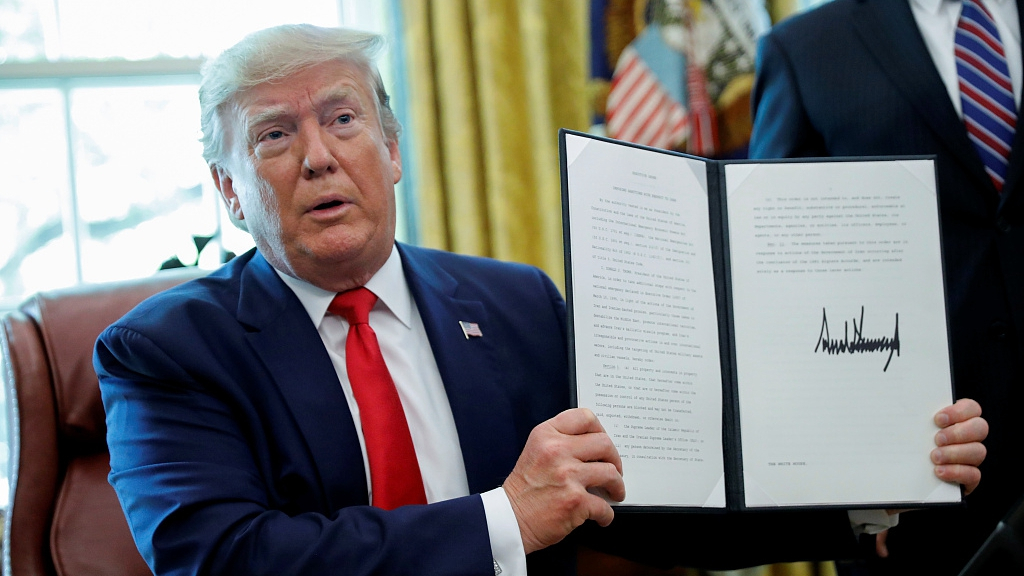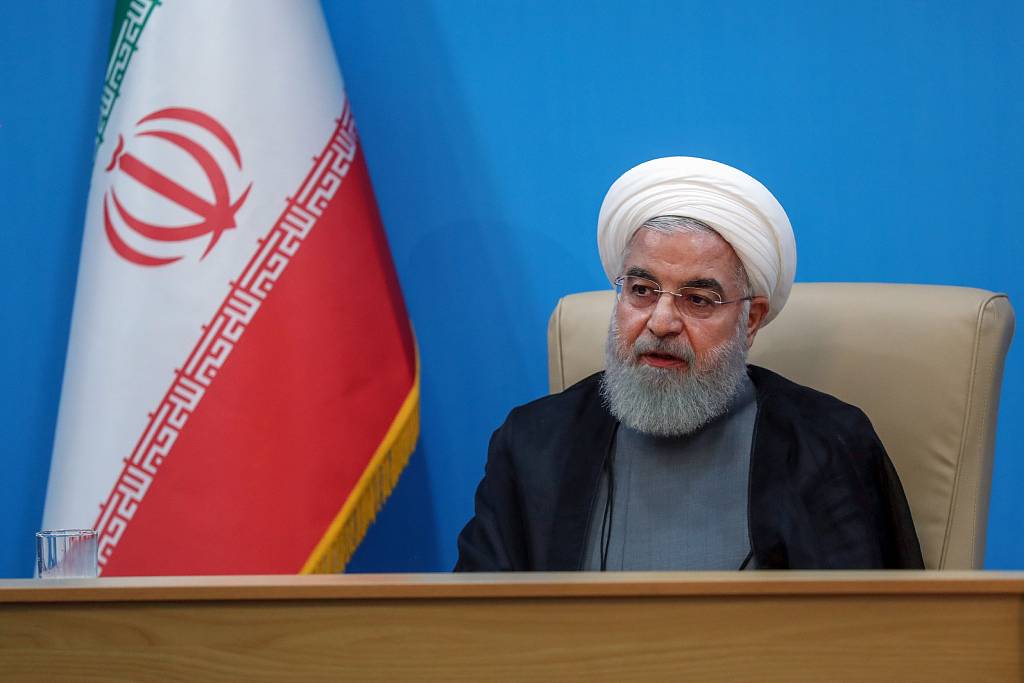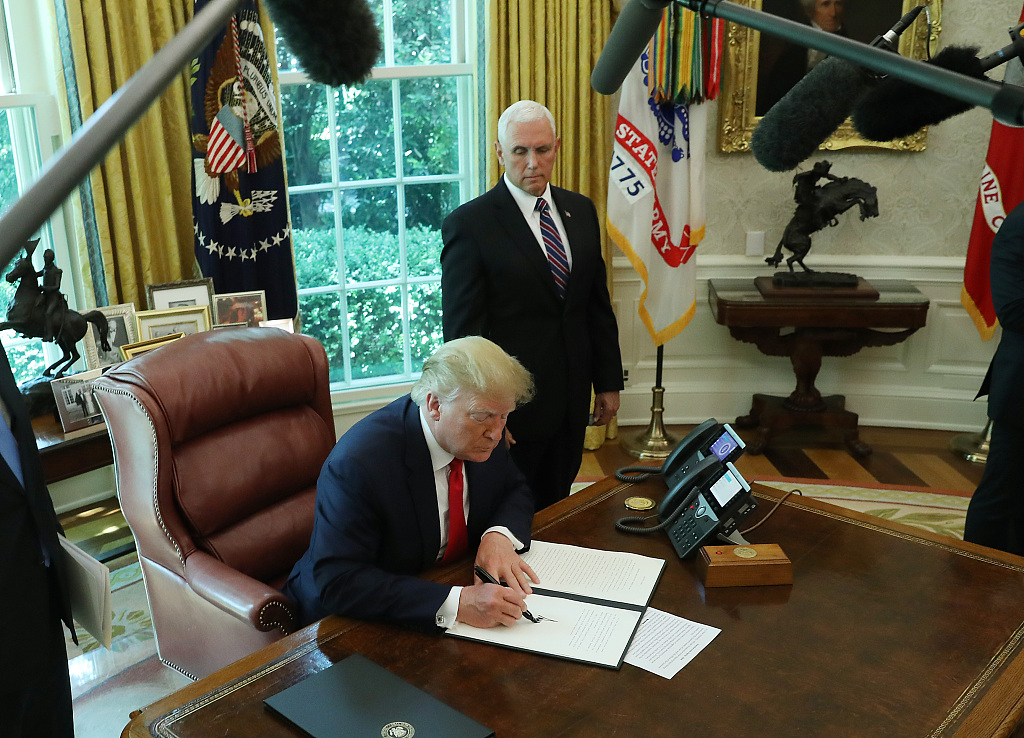

Editor's note: Tom Fowdy is a British political and international relations analyst and a graduate of Durham and Oxford universities. He writes on topics pertaining to China, the DPRK, Britain and the United States. The article reflects the author's opinion, and not necessarily the views of CGTN.
Tuesday saw the U.S. and Iranian presidents engaging in a war of words as tensions between the two countries continue to escalate.
As Trump announced new sanctions against Iran’s supreme leader and top officials on Monday, many pointed out that he mistook Ayatollah Khomeini, the founder of the Islamic Republic of Iran, who died in 1989, for the Supreme Leader Ali Khamenei. Iranian President Hassan Rouhani branded the White House as "mentally retarded," which saw Trump retaliate by calling Iran "ignorant." President Trump further reiterated the threat of military options against the country if Iran sought to attack "anything American."
For many observers of international affairs, the exchange seems strangely familiar.
Only two years ago Trump and the leader of the Democratic People's Republic of Korea (DPRK) Kim Jong Un had engaged in a similar vocal confrontation with Kim branding Trump a "dotard" in response to his threats to "totally destroy North Korea (DPRK)" — a series of tensions which at that time seemed extremely serious.

President Hassan Rouhani attend a meeting with ministers broadcast live on TV, Tehran, June 25, 2019. /VCG Photo
In each incidence and for that matter, many others, observers have questioned the logic and temperament of the White House in its diplomatic conduct.
Make no mistake about it, the entire foreign policy of the Trump administration is literally built upon pursuing a "maximum pressure" approach against everyone and everything, friend and foe alike. If Trump cannot get his own way, the answer is every time to induce confrontation, crisis and the threat of coercive action against the target country.
Many times, such crises are influenced by a personal desire to distract from scandals or unfavorable news at home. In doing so, America's credibility around the world is being placed in serious jeopardy. Nobody is impressed with this Iran crisis. You do not have to be a lover of Islamic theocracy to recognize that there is only one party in the wrong here, and it isn't the Mullahs in Tehran.
What is "Make America Great Again?" — As much as it is a simple and catchy slogan, it has deep connotations. Tapping into the sentiment of people's anxieties pertaining to a changing world, the phrase eludes to the restoration of an existing order or "normality" which is deemed to have been lost. On a foreign policy level, this appears to translate into a belief that America's hegemony and identity are under threat by changes in the international system. Trump utilizes populist rhetoric to subsequently claim that past leaders were weak and disinterested in pursuing America's interests properly.
As a consequence, this sentiment, armed with the president's typically coercive real estate tactics and the influence of Republican neoconservatism, the White House doctrine is effectively to pursue an indiscriminate "maximum pressure" strategy against the international community with the view of reaffirming a unilateral order orbiting around Washington.
If something is perceived to differ from the U.S. interests, then the answer every single time is to throw tariffs and sanctions at it, as well as threats to cut military and intelligence cooperation until the White House gets what it wants.

U.S. President Donald Trump signs an executive order imposing new sanctions on Iran in Washington D.C., June 24, 2019. /VCG Photo
For countries deemed adversarial to America, this approach has gone even further, with the White House pursuing the additional threat of outright military action against them.
Despite Trump pledging an isolationist approach and opposition to war, the reality is he has now been entangled in a growing number of military crises escalated by explicit threats to "completely destroy" or "obliterate" countries, the Iranian crisis being the latest example. At the heart of it all is the misguided belief that Tehran will somehow capitulate to American demands and surrender itself to the U.S.-led order in the Middle East.
One does not have to be a fan of Iran's political system to recognize that this drama is not actually their fault. They are being asked to negotiate when they were in compliance with a deal. Rather the conduct of the president and those around him has been dangerous, reckless and profoundly destabilizing.
In the bigger picture, this saga, combined with the "catch all" foreign policy of maximum pressure, is severely undermining Washington's credibility around the world. It does not create order or certainty; it creates anxiety, resentment and distrust. Whilst quite obviously the world is happy for the U.S. to be a major and dominant player in the international system, such must be conducted with responsibility and fairness, not bullying and extortion.
Thus, to conclude, several days ago Trump tweeted a graphic that implied his influence upon America's politics would outlive his presidency, in other words permanently changing the status quo. One thing is for sure that it certainly will, but not for the right reasons. The damage to America's reputation, trust and reliability will be set deep. If a democrat wins next year, they will have a mountain to climb in moving the country past the scenes we see now.
(If you want to contribute and have specific expertise, please contact us at opinion@cgtn.com)

Copyright © 2018 CGTN. Beijing ICP prepared NO.16065310-3
Copyright © 2018 CGTN. Beijing ICP prepared NO.16065310-3